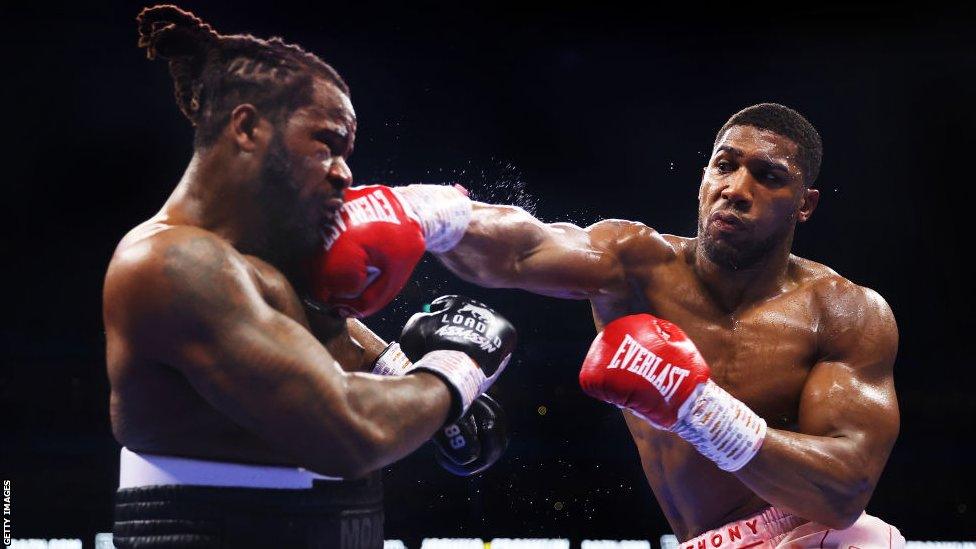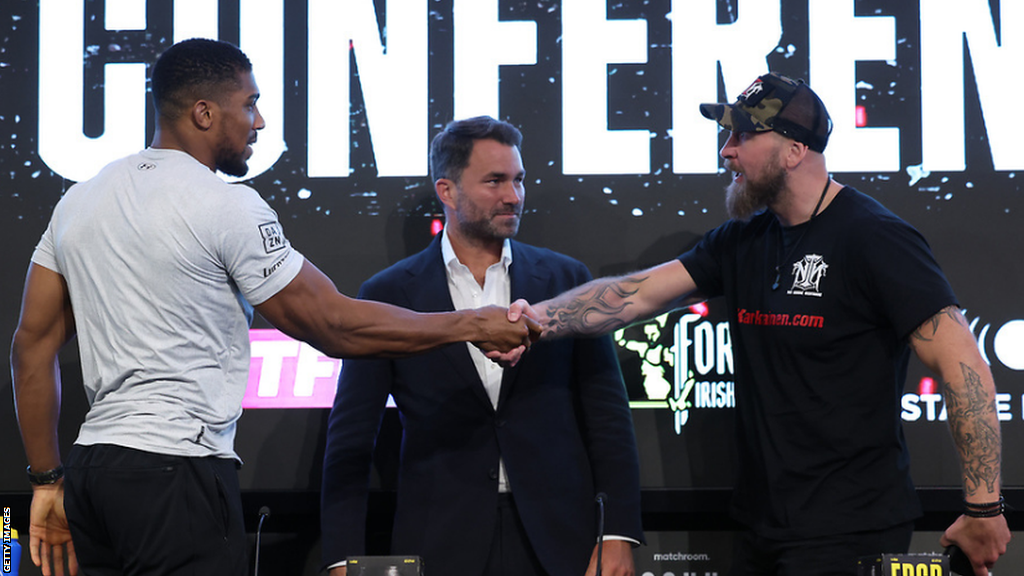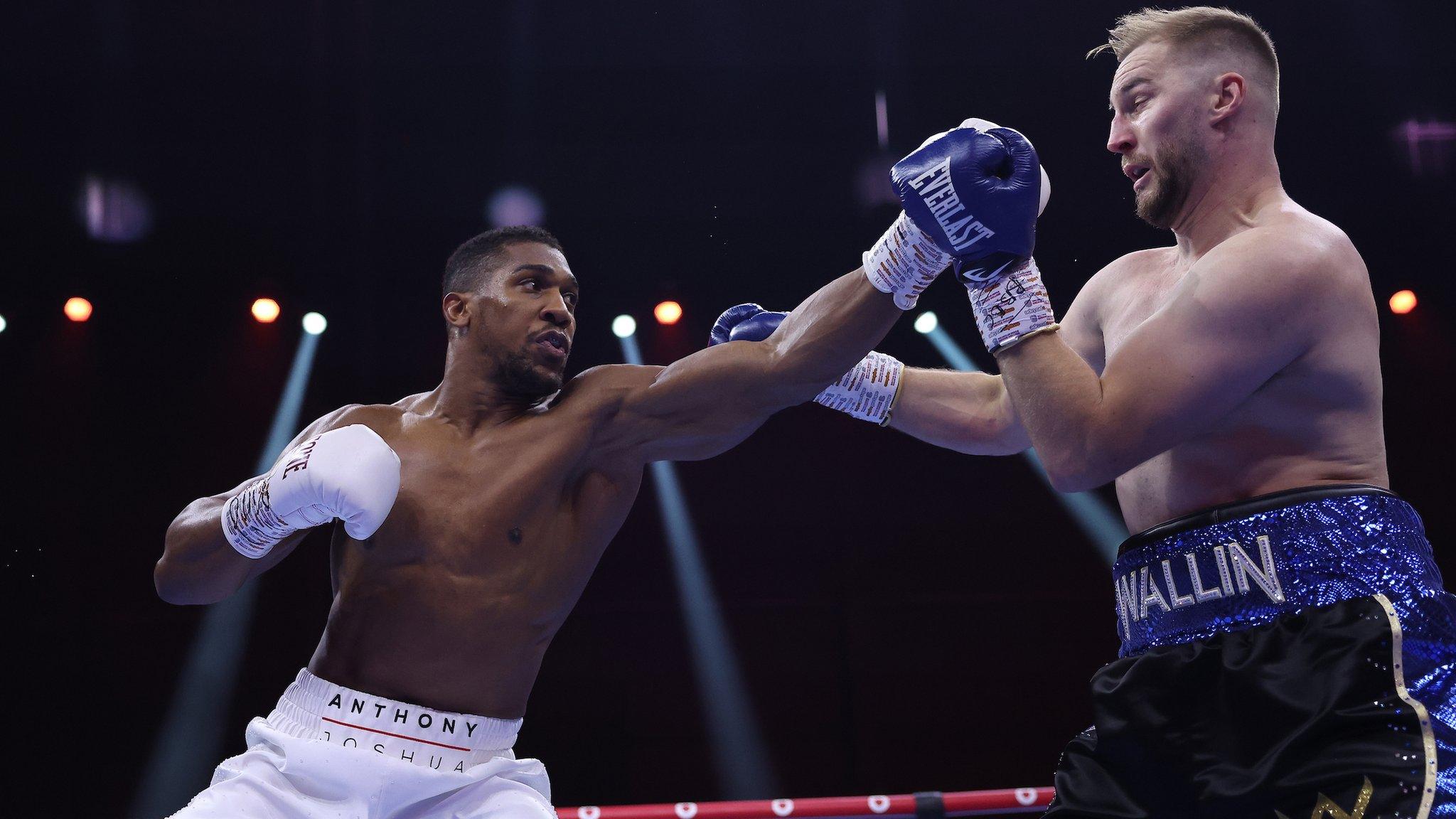Anthony Joshua: How British heavyweight chose Robert Helenius to keep Deontay Wilder dream alive
- Published
'Have you got a problem?' - Joshua & Helenius face off
Anthony Joshua v Robert Helenius | |
|---|---|
Venue: O2 Arena, London Date: Saturday, 12 August | |
Coverage: Radio commentary on BBC Radio 5 Live from 22:00 GMT, live text coverage and reaction on BBC Sport website & app from 21:00 GMT |
A blurry-eyed Anthony Joshua woke up to a message at 07:00 informing him that Dillian Whyte had failed a voluntary drugs test, forcing their all-British heavyweight rematch to be cancelled at just a week's notice.
"Damn, here we go again - late replacements aren't good for anyone," was his first thought, he says, quickly followed by: "Do I fight or do I not fight?"
Joshua felt a responsibility towards his promoter, the undercard boxers and fans who had booked travel and accommodation and insisted the show should go ahead.
"Let's just rock and roll," the 33-year-old decided.
Joshua has been here before - an opponent fails a drug test, leaving promoter Eddie Hearn scrambling for a late replacement while the dangling carrot of a lucrative fight with hard-hitting heavyweight Deontay Wilder lingers in the background.
In 2019, Olympic golden boy and unified world champion Joshua was embarking on a journey to crack America by taking on home fighter Jarrell Miller at New York's Madison Square Garden.
But when Miller tested positive for several banned substances, Mexican-American Andy Ruiz Jr stepped in at a month's notice.
I need to inflict pain to win - Joshua
On 1 June 2019, Ruiz Jr sent shockwaves through world boxing by stopping the Londoner in the seventh round, on a night that altered the trajectory of the seemingly invincible Joshua's career and scuppered an undisputed fight with Wilder.
Now AJ is once again on the cusp of a bout with Wilder, this time in the Middle East early next year.
"The [Ruiz] fight week, all we were talking about was Deontay Wilder - and here we are again," says Matchroom CEO Hearn.
It was imperative Hearn chose the right opponent this time round.
"It worries the life out of me that you could be making a decision that changes AJ's career when it's not even his fault," he adds.
Finding an opponent to keep Wilder dream alive

Olympic gold medallist Joshua (right) has won 25 fights and lost three
Joshua trained on Saturday, with no clue who he would be facing in seven days' time.
Rumours of a potential replacement began to circulate on social media.
Heavyweights from across the globe threw their name into the mix. Joshua, despite three losses to his name, is still a huge draw guaranteed to provide fighters with a solid purse.
"They had to source a credible opponent," Joshua says. And they had only a day or so to find one.
It had to be an orthodox fighter, with a somewhat similar style to Whyte. Joshua's good pal Derek Chisora - who is fighting on the undercard - was considered, as was his opponent Gerald Washington.
Germany's Agit Kabayel priced himself out. Filip Hrgovic welcomed the opportunity. The IBF mandatory challenger is also on the card, but was perhaps deemed too risky.
In the end it was Robert Helenius who was given the nod, with a deal signed by close of play on Saturday. For many fans, the Finnish heavyweight is an underwhelming choice, but appeasing boxing fans was not necessarily the priority.
Selecting an opponent to keep the Wilder dream, maybe even Joshua's career, alive was.
Hearn says: "It was down to the conversation with Anthony which was, 'I want to fight. I feel great. I've done 12 weeks of hard graft and I want to chin someone on Saturday night. And we want to go on and fight Deontay Wilder.'
Anthony Joshua: British heavyweight says 'boxing clearly has a doping problem'
"So we had to think on our feet, eradicate the time-wasters and make sure we could provide a good fight and a good test for him."
Medieval castle & cancelled holidays
The offer to fight Joshua first went to Helenius' manager Markus Sundman on Saturday afternoon.
Remarkably, Helenius was just about to compete at a 1,500-seater medieval castle in Finland against Mika Mielonen.
"My manager knew before but didn't say anything before the fight," Helenius says.
'The Nordic Nightmare' stopped Mielonen in the third round. As he went back to the dressing room, his team presented him with an unexpected proposal.
"They told me, 'We need to tell you something'," he says. "'We have news. Would you like to fight Anthony Joshua?' I was like, 'What? I've just fought'."
Helenius' planned family holiday would be "ruined".
"It was with the kids going up in the forest, just fishing and hunting, living by the cabin," he explains.
But after "five or 10 minutes" of deliberation, he decided the holiday could wait.
"I was like, 'Let's do this. I'm ready. This is what we do'," he says.
"When I win on Saturday it's going to be tremendous. My career's going to go upwards again."
No burden of belts but pressure to match Wilder

Joshua (left) and Helenius (right) have sparred together before
Hearn says representatives from Saudi Arabia will be in London this weekend, aiming to conclude negotiations for a January mega-fight between Joshua and Wilder.
"It will be one of the biggest heavyweight fights of our generation. We can't afford to not win [against Helenius]," he adds.
Helenius, who has lost four of his 32 fights and never challenged for a world title, is arguably an easier opponent than Whyte.
But Joshua admits there is the added pressure of trying to match the performance of potential future foe Wilder. 'The Bronze Bomber' sensationally stopped Helenius in just one round last October.
"No overtime in boxing," he says. "If you can win a game in one minute or eleven rounds or 12 rounds, I would rather do it in one. I would love to get a stoppage early on."
Joshua and Wilder have fought three mutual opponents before - Joshua stopped Jason Gavern and Eric Molina quicker, while Wilder knocked out Dominic Breazeale earlier.
"We'll just have to wait and see what happens with this fight," Joshua says.
"It's hard to compare because there's times I've beaten guys earlier on than he does, but until me and him fight no-one will know what will happen."
Joshua went into the Ruiz defeat as the champion. But without the burden of belts, he seems more relaxed with a hungry, challenger mindset.
At Wednesday's news conference he joked with journalists, gave straight answers and did not hold back when asked whether boxing has a doping problem.
He does not appear to be thrown by a late replacement, or reminded of the scars from the Ruiz defeat.
"I'm nervous. I'm pumped. I want to perform. I need to get the victory and I need to get the ball rolling again," he says.

The twisted mind of Michael Sams: Will Stephanie Slater's kidnapper be given parole?
A new drug, a new story, a new era: LA's streets are about to get more dangerous...

Related topics
- Published14 January 2024
